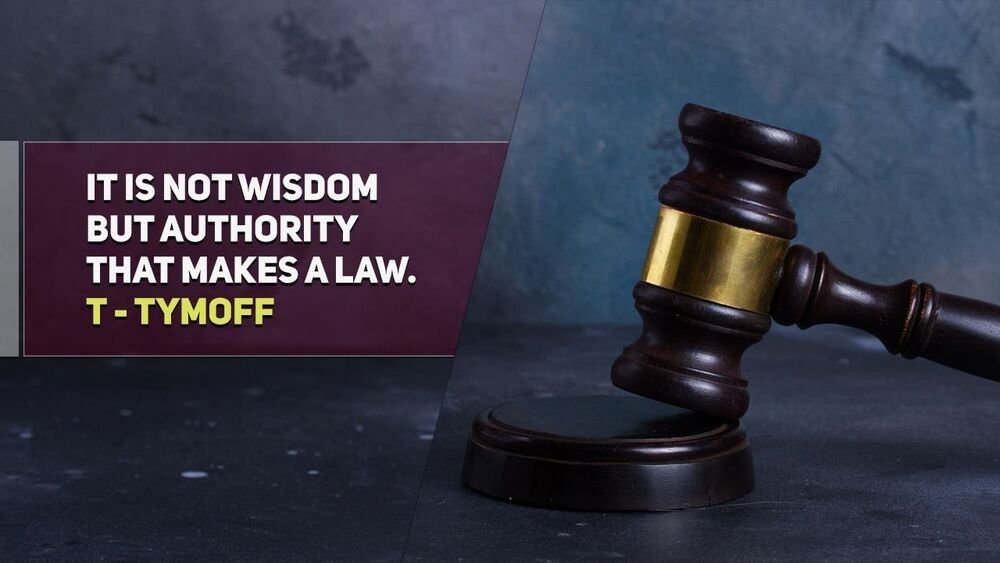It Is Not Wisdom But Authority That Makes a Law. T – Tymoff
Introduction “It is not wisdom but authority that makes a law.” This powerful quote, attributed to the enigmatic thinker

Introduction
“It is not wisdom but authority that makes a law.” This powerful quote, attributed to the enigmatic thinker T. Tymoff, challenges one of the most fundamental assumptions about justice and governance. While we like to believe laws are based on deep thought, morality, and the collective good, Tymoff boldly states otherwise. In this thought-provoking observation, he highlights a sharp divide between what is right and what is enforced. In today’s increasingly complex world—where legal systems shape every aspect of our lives—this statement has never been more relevant. The tension between authority and wisdom continues to dominate debates around legislation, justice, and civil liberties. But what does this quote really mean, and why does it matter?
Understanding the Quote
To grasp the weight of the quote “it is not wisdom but authority that makes a law. t – tymoff,” we must dissect its components. On one side, we have “wisdom”—symbolizing reason, ethics, and morality. On the other, “authority”—the sheer power to command, enforce, and legislate. While the ideal law might be a union of both, Tymoff suggests that in reality, authority alone dictates what becomes law.
T. Tymoff, a figure who remains somewhat mysterious in online discussions, often surfaces in philosophical and motivational circles. Regardless of his origin, this quote encapsulates an age-old truth: laws often serve those in power, not those guided by moral insight. Many people conflate legal correctness with moral rightness, but Tymoff dismantles this illusion by reminding us that enforcement, not enlightenment, determines legality.
The Power of Authority in Lawmaking
Authority is the cornerstone of legal systems. Governments, monarchs, and political bodies exercise the power to create and enforce laws—not necessarily based on collective wisdom, but on their legitimized position of power. From ancient empires to modern democracies, laws have historically been imposed by those holding institutional control.
Consider past regimes where authority ruled with an iron fist. In Nazi Germany, the Nuremberg Laws were not wise, just, or ethical—but they were legal. Similarly, South Africa’s apartheid system was maintained through a framework of lawful oppression. In both cases, authority triumphed over wisdom.
Governments around the world continue to create laws that serve political agendas, lobbyist interests, or short-term gains rather than long-term wisdom. For instance, some environmental regulations are rolled back to benefit industry, despite overwhelming scientific consensus urging ecological caution. Here, Tymoff’s quote becomes a chilling reminder that legality does not always equate to morality.
The Role of Wisdom in Justice
If authority enforces law, wisdom provides its soul. Wisdom draws from history, philosophy, human experience, and ethical reasoning. It promotes fairness, inclusivity, and long-term societal benefit. However, wisdom often lacks the power to become law on its own. It needs advocates, political will, and public momentum to be transformed into enforceable policy.
Philosophical wisdom, though slow-moving, shapes legal systems over time. Think of how civil rights movements, based on the moral wisdom of equality, eventually influenced landmark legislation. However, such transitions are often delayed, resisted, or even ignored—because wisdom does not inherently hold legal power.
Wisdom is aspirational. It acts as a compass, guiding those who legislate. But unless that wisdom is wielded by individuals or institutions in positions of authority, it remains an ideal rather than an enforceable reality.
Historical Background and Philosophical Roots
Throughout history, the relationship between wisdom and authority has been explored extensively by thinkers like Plato, Hobbes, and Locke. Plato’s ideal republic placed philosophers—symbols of wisdom—at the helm of governance. In contrast, Hobbes believed that societal peace could only be achieved through an absolute sovereign whose authority was unquestionable, regardless of moral standing.
Locke, meanwhile, envisioned a balance: authority derived from the consent of the governed and guided by natural rights and reason. His ideas influenced democratic systems where authority was held accountable to the people—introducing a hybrid model where wisdom and authority could coexist.
Despite these ideals, most ancient legal systems operated under monarchies, religious theocracies, or imperial rule—where laws stemmed from divine right or sheer dominance, not collective wisdom.
Modern Implications of Tymoff’s Quote
In contemporary times, Tymoff’s quote remains eerily accurate. Laws continue to be shaped more by political will than by universal wisdom. Governments with legislative power can impose emergency measures, enact controversial policies, and redefine public rights—all within the legal framework they control.
For example, surveillance laws enacted after terrorist attacks often prioritize national security over civil liberty. While arguably necessary, they highlight how authority can create sweeping laws that may not align with broader ethical concerns about privacy.
In autocratic regimes, laws are tools of suppression rather than protection. Citizens may be punished for dissent, expression, or even basic rights. These laws are legally binding, but morally bankrupt—proving Tymoff’s point: authority, not wisdom, makes the law.
Consequences of Authority Without Wisdom
When authority is unchecked by wisdom, the result is often societal harm. Legal systems devoid of moral guidance can lead to widespread injustice, oppression, and inequality. These systems may operate efficiently, but they fail to serve their people fairly.
Public trust in law diminishes when laws are perceived as tools of control rather than justice. This erosion of trust breeds civil disobedience, unrest, and in extreme cases, revolution. History shows us this repeatedly—from the French Revolution to anti-colonial movements—when people rise against laws created by authority without wisdom.
Even in democratic countries, laws that disproportionately affect minority groups—such as voter ID laws, policing policies, or housing regulations—can be legally sound but ethically problematic. These examples underscore the dangers of divorcing authority from moral insight.
The Ideal Balance: Authority and Wisdom
While Tymoff’s quote highlights a harsh truth, it also opens the door to a necessary question: can authority and wisdom work together? Ideally, yes. In healthy democracies, this balance is achieved through systems like judicial review, legislative debate, public consultation, and constitutional safeguards.
Judiciaries often serve as the wisdom arm of the government, interpreting laws through ethical lenses. Civil society, think tanks, scholars, and advocacy groups inject wisdom into public discourse, pushing back against purely authoritarian impulses.
Checks and balances ensure that no single entity holds unchallenged power. Public participation in lawmaking—through referendums, protests, and voting—helps align laws with collective wisdom rather than elite authority.
Public Responsibility in a Law-Governed Society
Citizens have a crucial role to play in bridging the gap between authority and wisdom. A passive society allows authority to act unchecked, while an informed and engaged public demands laws rooted in justice.
Educating people on the difference between legal correctness and moral righteousness is essential. Media, educational institutions, and community leaders must foster critical thinking. Activism, public debate, and voting are tools by which wisdom can influence authority.
Democracies thrive when their citizens do not blindly obey but instead question, challenge, and demand better laws—laws that serve not just the powerful, but the ethical fabric of the entire society.
Conclusion
The statement “it is not wisdom but authority that makes a law. t – tymoff” serves as both a critique and a warning. It reminds us that the structures governing our lives are not always built on morality or ethics—but on power and enforcement. While laws can offer order, they do not inherently guarantee justice.
Understanding this distinction is vital in today’s world. As citizens, lawmakers, and thinkers, we must strive to ensure that authority does not operate in isolation. Only by embedding wisdom into our legal frameworks can we hope to create laws that are not only enforceable but just, equitable, and enduring.
In the end, the law should not be a tool of the powerful, but a reflection of collective wisdom—implemented through rightful authority. And that, perhaps, is the ultimate lesson behind Tymoff’s enduring quote.
Also read interesting topics at Techkmagazine








